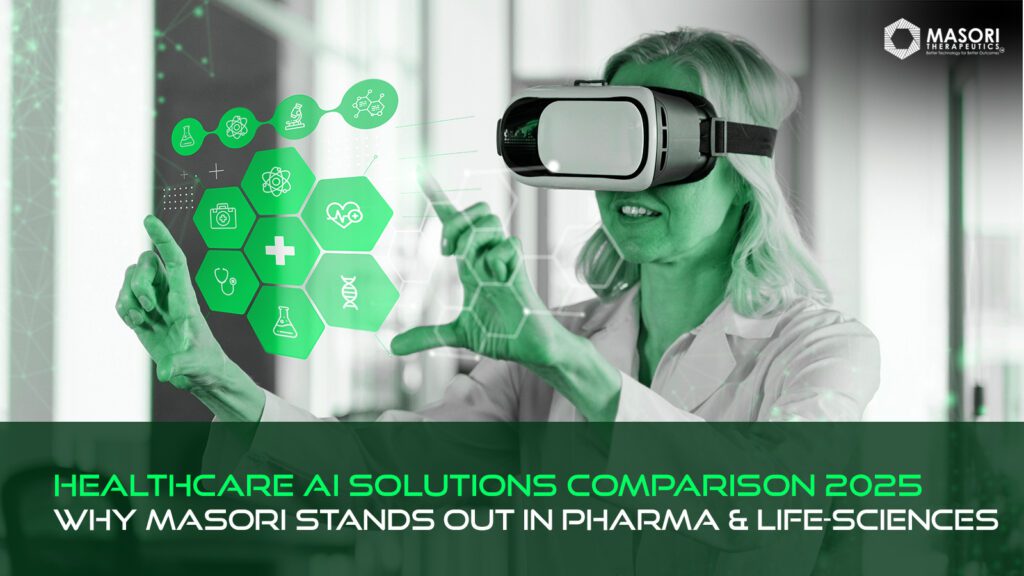
The healthcare AI Solutions landscape has evolved dramatically over the past few years, with 2025 marking an inflection point in adoption across pharmaceutical and life sciences organizations. As the market matures, clear differentiators have emerged among solution providers, with capabilities becoming increasingly specialized for industry-specific challenges. This evolution has created both opportunities and complexities for decision-makers evaluating healthcare AI investments.
The healthcare AI market has consolidated around several core capabilities essential for pharmaceutical and life sciences applications:
While many solutions offer subsets of these capabilities, Masori has distinguished itself by delivering a comprehensive platform specifically engineered for the unique demands of pharmaceutical and life sciences organizations.
Traditional AI platforms struggle with the unique data challenges of pharmaceutical environments. Masori’s architecture was designed specifically for life sciences data harmonization, addressing the distinct requirements of:
This purpose-built foundation enables pharmaceutical organizations to unify previously siloed information into cohesive datasets ready for AI analysis. The platform accommodates structured, semi-structured, and unstructured data while maintaining rigorous compliance with healthcare data governance requirements.
Unlike general-purpose AI platforms that require extensive customization before delivering value, Masori provides pre-trained models specific to pharmaceutical and life sciences applications. These models arrive ready to address common industry challenges, including:
By leveraging these pre-trained foundations, life sciences organizations typically achieve actionable insights 60-70% faster than with platforms requiring custom model development from scratch.
Pharmaceutical AI applications face unique regulatory scrutiny. Masori integrates regulatory intelligence directly into its platform architecture, ensuring that all AI implementations maintain compliance with:
This built-in regulatory framework dramatically reduces validation time and compliance risk compared to general-purpose AI platforms subsequently adapted for healthcare use.
Rather than functioning as a standalone analysis tool, Masori’s AI capabilities integrate seamlessly into existing pharmaceutical workflows. This integration spans the entire value chain:
This workflow-centric approach drives adoption rates averaging 3x higher than standalone AI solutions by embedding intelligence into daily processes rather than creating separate analytical pathways.
Healthcare decisions demand transparency in AI reasoning. Masori’s explainable AI framework provides clear visibility into:
This transparency is particularly crucial in pharmaceutical settings where safety considerations and scientific rigor are paramount.
The true test of any healthcare AI solution is its measurable impact on outcomes. Masori’s pharmaceutical implementations have demonstrated significant advantages across key performance indicators:
In Drug Discovery:
In Clinical Development:
In Commercial Operations:
These performance improvements translate directly to accelerated timelines, reduced costs, and ultimately, faster delivery of life-changing therapies to patients.
When evaluating healthcare AI solutions for pharmaceutical applications, several implementation factors should guide decision-making:
As we progress through 2025, the distinction between general-purpose AI platforms and specialized life sciences solutions like Masori continues to widen. Pharmaceutical organizations increasingly recognize that effective AI implementation requires more than technical capabilities—it demands deep domain expertise, purpose-built architecture, and seamless integration with industry-specific workflows.
By focusing exclusively on the unique needs of pharmaceutical and life sciences organizations, Masori has established itself as the partner of choice for companies seeking to transform drug discovery, development, and commercialization through artificial intelligence. As AI becomes increasingly central to competitive advantage in the life sciences industry, choosing the right implementation partner has never been more crucial.
While general-purpose AI platforms offer broad technical capabilities, Masori delivers pharmaceutical-specific advantages including pre-validated life sciences data models, regulatory compliance frameworks built into the core architecture, and workflow integrations designed specifically for drug development and commercialization processes. These specialized capabilities typically reduce implementation time by 40-60% compared to adapting general-purpose platforms for pharmaceutical use.
Masori provides purpose-built connectors for more than 60 common pharmaceutical data systems including leading LIMS, EDC, CTMS, and ERP platforms. The solution includes specialized data harmonization tools that understand life sciences terminology variations, experimental protocols, and regulatory documentation formats. For legacy systems without standard connectors, Masori’s implementation team develops custom integrations using the platform’s pharmaceutical-specific ETL framework.
A3: Masori’s explainable AI framework documents every step in the decision process, from data inputs through analytical reasoning to final recommendations. The system generates regulatory-ready documentation that meets FDA and EMA requirements for AI transparency, including comprehensive data provenance, explicit confidence intervals, and clear identification of potential limitations. This documentation is automatically formatted to support regulatory submissions and audits.
Masori employs a multi-layered security approach designed specifically for life sciences data protection, including end-to-end encryption, federated learning capabilities that keep sensitive data within customer environments, comprehensive access controls aligned with pharmaceutical role definitions, and continuous security monitoring. The platform maintains key healthcare security certifications including HITRUST, ISO 27001, and SOC 2 Type II, with validation documentation ready for inclusion in customer quality systems.
Most Masori pharmaceutical clients achieve positive ROI within 6-9 months of implementation. Initial use cases typically focus on operational efficiency improvements with rapid payback periods, such as clinical trial protocol optimization or HCP targeting refinement. As implementation expands to more strategic applications like drug discovery or lifecycle management, organizations generally see more substantial returns with 3-5x ROI within 18-24 months. Masori’s implementation team works with each client to develop a value realization roadmap with clear milestones and measurement frameworks.